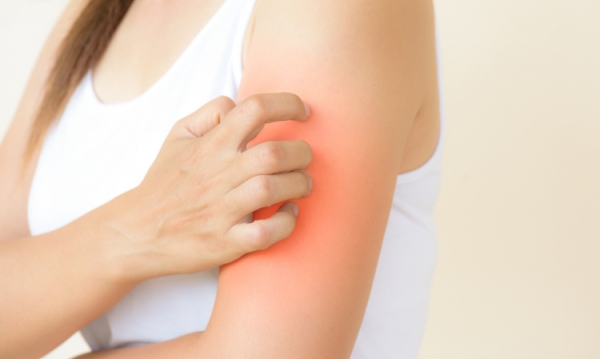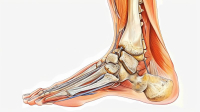What is atopic dermatitis?
Let’s start from the beginning. What is atopic dermatitis? In different words – eczema – is a chronic inflammation of the skin. In a nutshell, it consists of the abnormalities of the epidermal barrier function.
The disease very often appears during childhood. In a large number of cases, symptoms resolve with adolescence, but can sometimes be life-long. Atopic dermatitis is also characterized by sudden relapses. Among persistent and uncomfortable symptoms, we can include e.g.:
- itchy skin that causes you to scratch frequently,
- increased dryness of the skin,
- red, raised lesions with characteristic locations on the body,
- intensification of the disease associated with temperature changes,
- exacerbation of itching caused by stress.
A test is not needed to diagnose atopic dermatitis – a doctor is usually able to recognize the disease at first glance. As far as diagnosis is concerned, it doesn’t pose any major problems. Unfortunately, this doesn’t apply to identifying its genesis.
Indeed – what causes atopic dermatitis? Medicine didn’t find a certain answer in that case. However, it’s believed that it may be related to genetics and dysfunction of the immune system. Environmental factors are also taken into account. On the question – how to get rid of atopic dermatitis – there's also no certain answer. As a genetic abnormality, the disease can return suddenly when we least expect it. The factors that may increase atopic dermatitis are primarily stress, but also contact with allergens. Usually in everyday products, we can, unfortunately, find a lot of ingredients that aren’t favorable to eczema. That’s why special attention, when it comes to proper care and avoiding certain factors, plays a major role in the treatment of eczema.
How to cure atopic dermatitis?
Atopic dermatitis skin care is the most important medication. Proper care and avoiding irritating factors are the key to successful eczema treatment. What’s worth remembering in order to relieve bothersome symptoms?
- Bath? Maybe a shower after all… Atopic skin doesn’t like long soaking in hot water. Therefore, it’s worth avoiding their frequent contact. However, if you wet your skin – moisturize the body after it to avoid drying out. It’s recommended to apply the cream on wet skin – it’ll absorb the product like a sponge.
- It’s also worth paying attention to what you use for the care and hygiene of your body. There are a lot of specialized products on the market for people suffering from atopic dermatitis. They’re much more gentle than standard products – they have fragrance-free formulas and don’t contain irritating ingredients such as SLS. So they definitely minimize the risk of increasing symptoms.
- Did we say anything about moisturizing? Let's say it again and again. Rehydrating is the basis of atopic dermatitis self-care. Your skin is thirsty all the time. Bring her relief. Both from the outside (by using moisturizing balms) and from the inside (by drinking a lot of water).
- The laundry really counts!. When it comes to eczema, traditional laundry products are highly inadvisable. Harsh detergents contained in them increase the occurrence of allergies and irritations, even in people, who don’t have any skin problems. Choose hypoallergenic and unscented laundry detergent to minimize the risk of your eczema getting worse.
- Think about a humidifier. These types of devices allow you to maintain an appropriate level of hydration in the rooms. It seems that it has a little effect on the skin, but it helps a lot, really!
A “cycle of itching, scratching and more itching” – this is how doctors use a metaphor to describe atopic skin inflammation. Thanks to proper care and avoiding certain ingredients or factors, a person suffering from eczema can effectively break this cycle and beat intensification of the disease. That’s why the knowledge about – how to treat atopic dermatitis – really matters.






